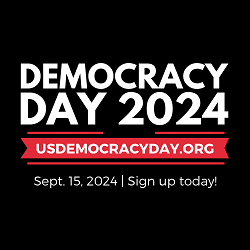Why would local governments withhold information from the public, rather than provide it on request — or even proactively?
Responding to requests can be time consuming, expensive and legally risky, said award-winning journalist Miranda Spivack, author of the forthcoming book, “Backroom Deals in Our Backyards: How Government Secrecy Harms Our Communities and the Local Heroes Fighting Back.”
And, she added, sometimes the people with the information simply don’t know what the law requires them to disclose.
Spivack shared her thoughts in a recent interview with Lila LaHood, executive director of the San Francisco Public Press, at an event where they discussed government transparency. This excerpt from their conversation has been edited for length and clarity.
In this episode of “Civic Presnts,” hear LaHood’s full interview with Miranda Spivack at a July 11 event that featured a question-and-answer session with the audience.
You have said that there is evidence that points to secrecy in state and local government being on the rise. How do we know this, and what explains this increase?
Starting with 9/11 (the 2001 terrorist attacks on the U.S.), there was a big retrenchment in government transparency at the local level.
From that time on, there is a lot of evidence that governments are just not living up to state public records laws. It’s inconvenient. It’s costly. It’s everything from they don’t know where the information is, to they haven’t digitized their records.
When a state or local agency says it doesn’t have or doesn’t want to give up information, what are the most common reasons you hear?
There are a couple I think are occurring with greater frequency. One of them is the use of the “trade secrets exemption,” which is all over the country. It’s in the federal FOIA (Freedom of Information Act) law, too, and allows private contractors to say “that’s a proprietary piece of information,” that our competitors are going to be tipped off on.
There are sometimes security and privacy issues. The “investigative exemption” is used a lot, where a government agency will say, “this is still under investigation.” But, of course, investigations do not go on for five years, and documents that are older should be available. But they want to charge you a lot of money for this stuff. And that’s a big deterrent.
Watch the full interview and audience questions.
Can you point to any places where the system for getting access to public records works really well? Conversely, where have you run into the most obstacles?
It’s very erratic, even within a state. You can have government employees who really do want to be helpful. I think places that have digitized their documents have a better chance of putting the information up online. You shouldn’t have to file a public records request just to find out who the contractors are in San Francisco to cross check them with public finance and campaign finance reports.
How does our government’s ability to keep and record large quantities of information affect its willingness to provide access to that information?
Around the country, and probably within California, smaller governments are not well funded. Legislatures don’t necessarily fund their own state agencies very well. So, you know, there is a bona fide issue that I have to acknowledge, which is that this is not an inexpensive process — although it should be, given that we have all this technology.
I’ll tell you that the email searches are very hard. They don’t know who’s got the emails. They don’t know where it is. Is it on the main server? Is it on somebody’s laptop? Those are really hard issues.
Should governments retain all their digital files forever? Or might it make sense to clear certain things out after a certain period of time?
Probably five years is a good measure for most records. I think law enforcement records have to be kept much longer. A lot of it has to do with who has the server. Does the city own the server? Is it outsourced to some private contractor? What are they charging for it? I think those are all real considerations.
What do you think motivates people to withhold information?
So, there is a fellow I know in Washington, Tom Susman, who actually helped write the amendments to the Freedom of Information Act in the 1970s. He says the mindset is, “when in doubt, don’t give it out.”
In some states, you can be sued as a government employee if you give out information that you shouldn’t give out. There’s a big fear factor.
If you look at police agencies, the culture is, “We’re a paramilitary organization, and that means you cannot have the insight into what we’re doing.”
Your book is about people who were trying to improve their communities and, in the process, took on governments that were withholding public information. How did you decide which stories to include in the book?
The book has five profiles of different people from around the country whom I’m calling accidental activists. They don’t get into this because they want to. They really get into this because they have to.
These stories just spoke to me. As a journalist, it’s hard to do this work, and so I was very interested to see how novices would go about doing this. Their success and failures were really instructive, because I think state and local government is really where people’s lives are most clearly affected.
One of the stories is about poisoned drinking water. Another is toxic chemicals in firefighter gear. There’s a story about dangerous roads.
Can you explain in a nutshell why government agencies wouldn’t want people to know which roads were the most dangerous?
Well, you’re being logical. Congress passed a law a couple of decades ago in response to state governments who were worried that they would get sued if they had a list of the top 10 worst roads in their state that they wanted to apply for federal funds for. So, they know where the problems are, but they’re not fixing them and they were very worried that they would get sued for negligence.
Can you talk a little bit about why civic engagement matters on the local level, especially in this era of hyperpolarization?
One of the biggest problems is that people don’t trust the government. They think the government is hiding stuff. Governments, I think state and local in particular, can do a lot to be more open about what their process is, what they’re doing, who they’re working with, who the mayor is meeting with. What’s the harm in that?
And yet, there’s this sort of a defensive crouch. I think in a lot of governments, there’s a lot of fear. There are issues that I think are legitimate where politicians really feel that they are being hounded unnecessarily. I think the press has to be careful about what you go after and what you make a big issue about. But there’s really a nexus between transparency and government and civic engagement, and keeping our democratic system “small d” democratic.
Wondering which state governments are the most responsive to records requests? Check out this interactive tool by MuckRock, a news site focused on government transparency and accountability.
This article is part of U.S. Democracy Day, a nationwide collaborative on Sept. 15, the International Day of Democracy, in which news organizations cover how democracy works and the threats it faces. To learn more, visit usdemocracyday.org.










